Croatian New Year’s Eve Pork Roast is a traditional festive dish with sautéed sauerkraut and apples, pork, sausages, and potatoes, all infused with white wine and roasted together.
Recipe Intro
Pork roast is a traditional New Year’s Eve dish popular in many Central and Eastern European countries, including Germany, Austria, Poland, Slovakia, Slovenia, Croatia, and northern Italy. In many of these cultures, it’s seen as a festive dish to celebrate the turn of the year, symbolising abundance and good fortune.
I was raised with the culinary traditions of Italy and Croatia, with pork roast as the highlight of our New Year’s Eve feast. Alongside the roast, we always had cotechino, an Italian pork sausage thought to bring prosperity in the new year. Sometimes my mother would make sarma, pickled cabbage leaves stuffed with minced pork and rice.
As for the other reason why is this meal essential for New Year’s Eve? Well, after indulging in a few too many celebratory drinks, the best cure for a hangover is hearty food! And there is nothing better than a plate of pork, potatoes, and sauerkraut. It’s practically a miracle worker! You can’t go wrong with this feast, and trust me, it’ll help you recover and start the year feeling right. 🙂
Roasted pork and sauerkraut is one of my favourites, a dish I prepare every New Year’s Eve. The pork is juicy and flavourful, complemented by fluffy, crispy roasted potatoes and sweet-and-sour sauerkraut – delicious! It is also perfect for a winter Sunday lunch!
Festive Pork Roast Ingredients
This dish can be as festive as you like. You can add different cuts of pork, a mix of your favourite sausages, and even pancetta or bacon. In addition to the potatoes, feel free to include carrots and parsnips.
- pork – Choose the cut that suits your preference – pork loin, leg, or shoulder joint all work perfectly. I prepared it with boneless pork leg joint.
- sausages – Choose a mix of smoked, spicy, or blood sausages. I used two types of sausages: fresh pork sausages with spices and apple, and spicy chorizo. However, using just one variety works perfectly fine.
- potato – Use floury varieties like Maris Piper or King Edward, as they roast beautifully and become crispy on the outside while soft on the inside. You can also add sweet potatoes for a bit of variety.
- sauerkraut – For the sauerkraut, you can buy any type you prefer, but always taste it first, as some brands can be quite salty. If that’s the case, rinse it under cold water to reduce the saltiness. This dish can also be made with plain white cabbage, just slice it or grate it thin.
- onions – Use a mix of yellow and red onions.
- garlic – Use fresh garlic.
- white wine – Feel free to use any type you prefer, whether dry or sweet.
- rosemary – Use whole sprigs for both decoration and aroma. A few bay leaves and fresh parsley are also great additions for extra flavour and garnish for your festive pork roast.
For the sauerkraut
- apples – any type is fine
- bacon – smoked or unsmoked
- onions – yellow
- herbs – bay leaf, marjoram
- caraway seeds – whole or ground, or mix. They are a key ingredient for enhancing the flavour of sauerkraut. They add a distinctive, slightly nutty and earthy taste that perfectly complements the tanginess of the cabbage.
🐷 🍴 While you’re here, take a look at these irresistible pork dishes from around the world:
– Chinese sweet pork belly
– British pork and leek stew
– Polish Golabki – stuffed cabbage with pork
How to make Festive pork roast with sauerkraut
1. Prepare the pork
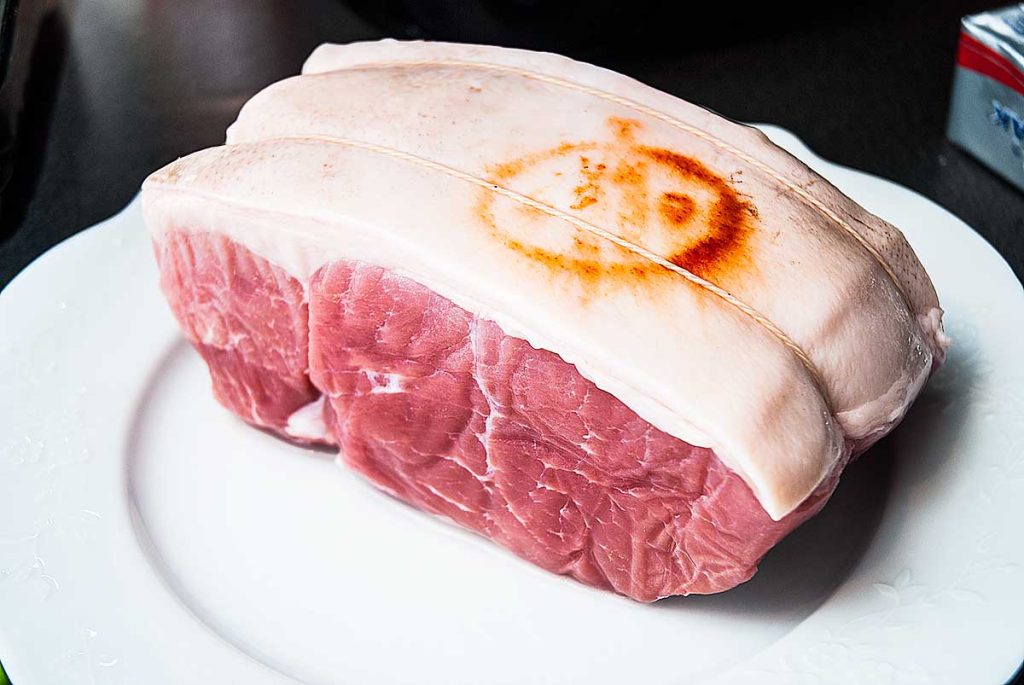
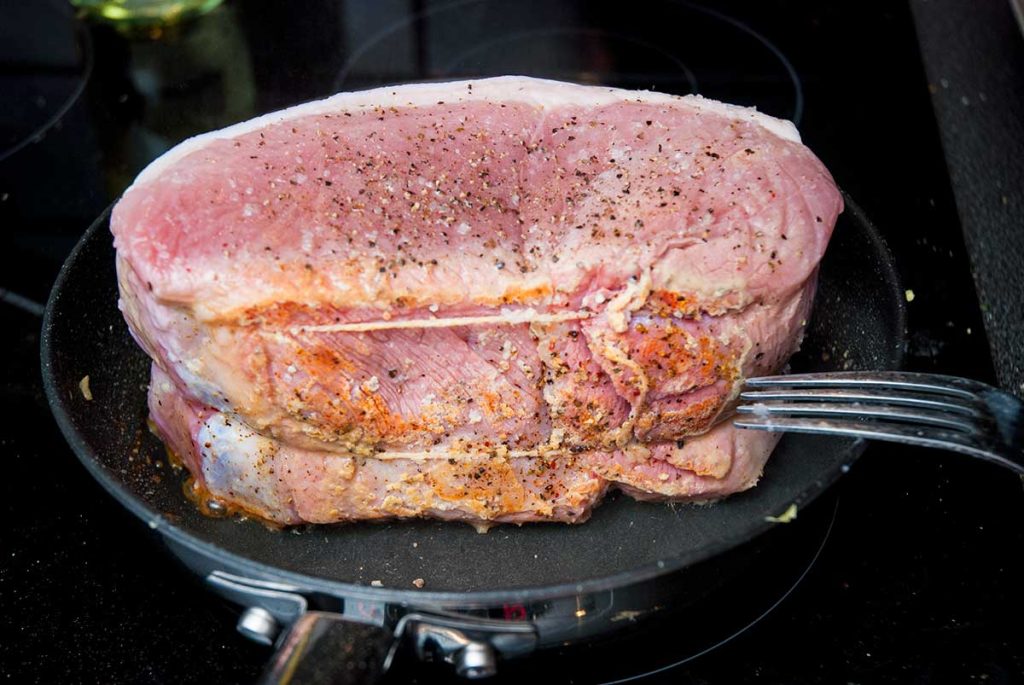
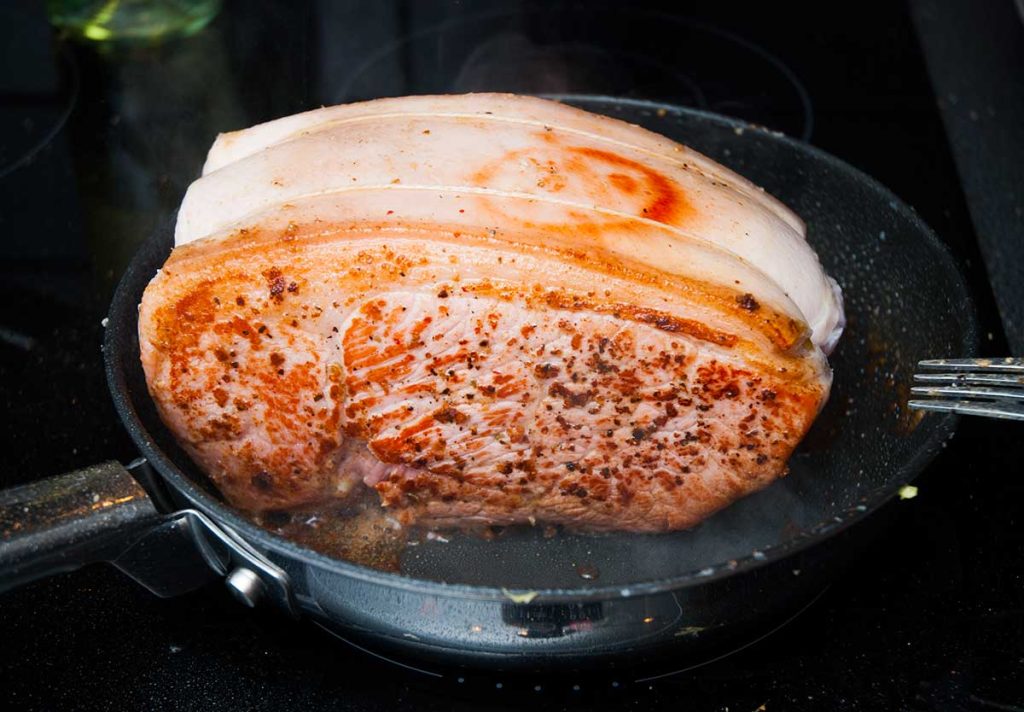
Rub the meat with salt and pepper, then place it in a large pan with a small amount of oil. Sear each side for a few minutes until nicely browned. This step locks in the juices and enhances the flavour, creating a delicious crust that will add depth to the roast.
2. Prepare the sauerkraut
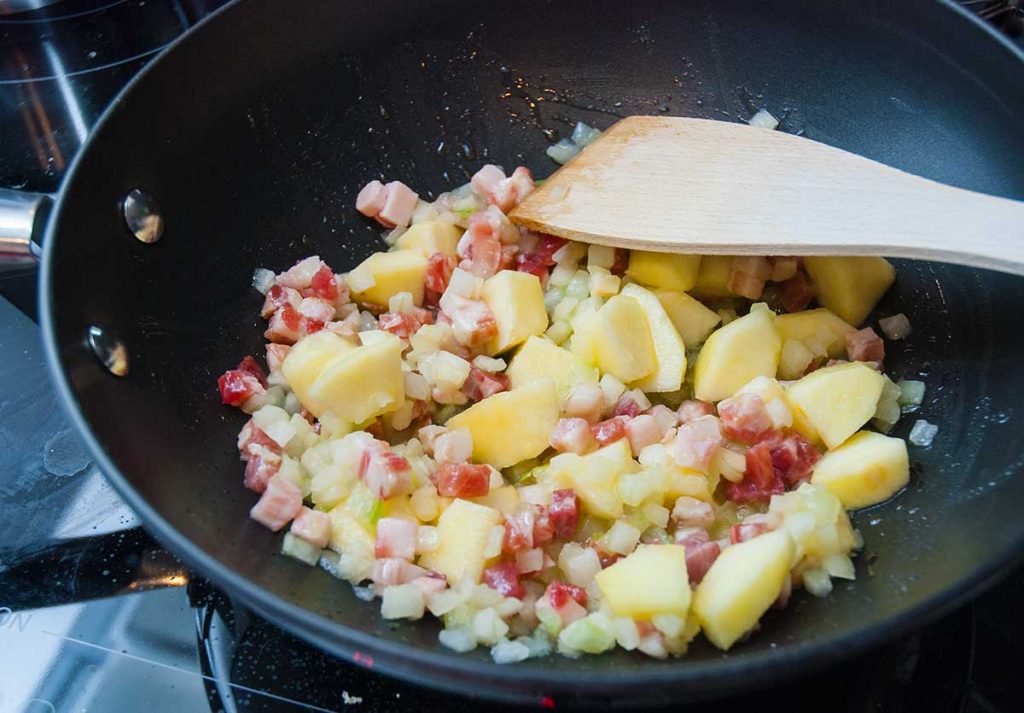
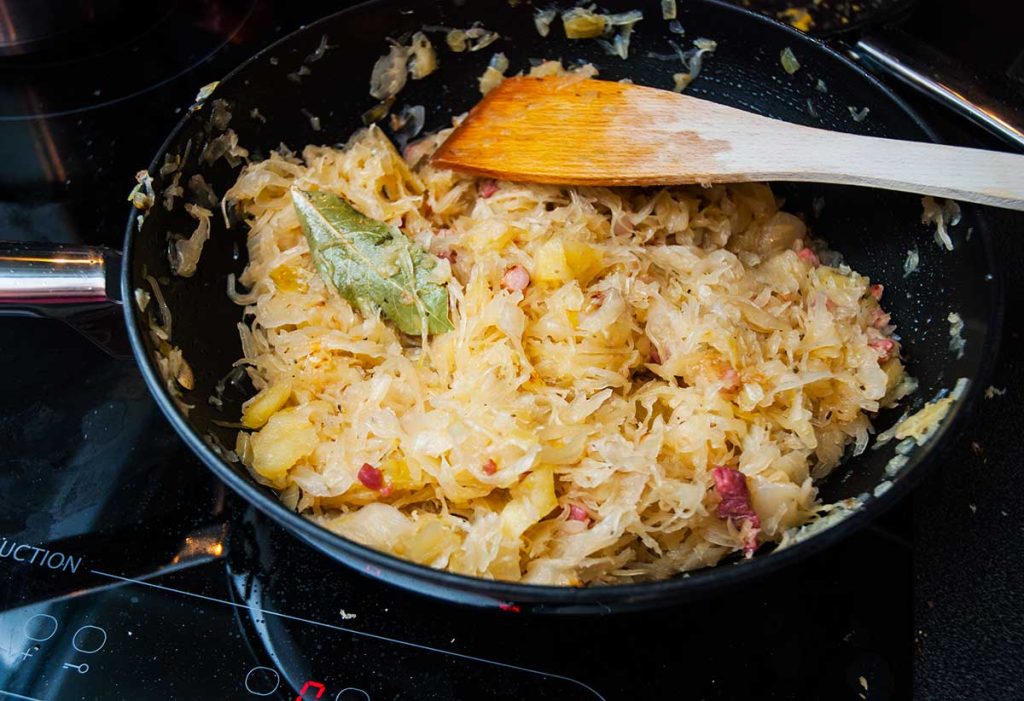
- Heat the oil in a medium-sized pot or deep pan and add chopped onions, peeled and diced apples, and finely chopped bacon or pancetta. Sauté for 7 minutes, stirring occasionally, until the bacon is slightly crispy.
- Add the garlic and bay leaves, and cook for another minute to release their aromas. Garlic is added at this stage to prevent it from burning while the onions and apples are frying.
- Taste the sauerkraut before cooking to check for salt. If it’s overly salty, give it a quick rinse under cold water to reduce the saltiness. Once rinsed and drained, add the sauerkraut to the pan with the onions, apples, and bacon. Season with pepper, ground caraway, and marjoram, then mix well to blend all the flavours. Add one cup of water and simmer for about 15 minutes, allowing the liquid to evaporate.
3. Assemble the dish
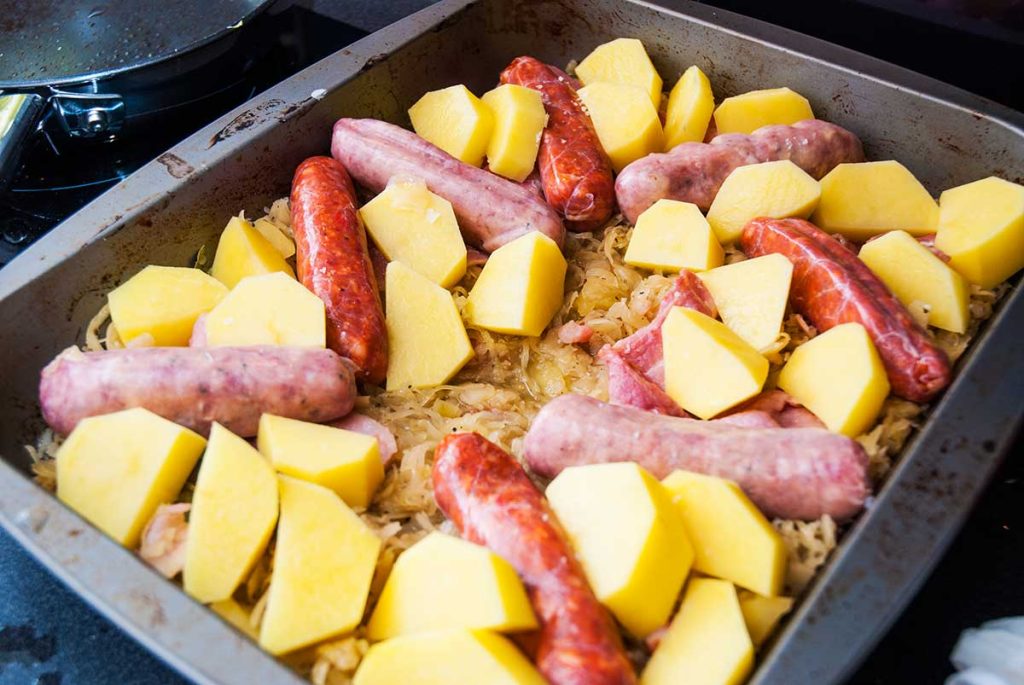
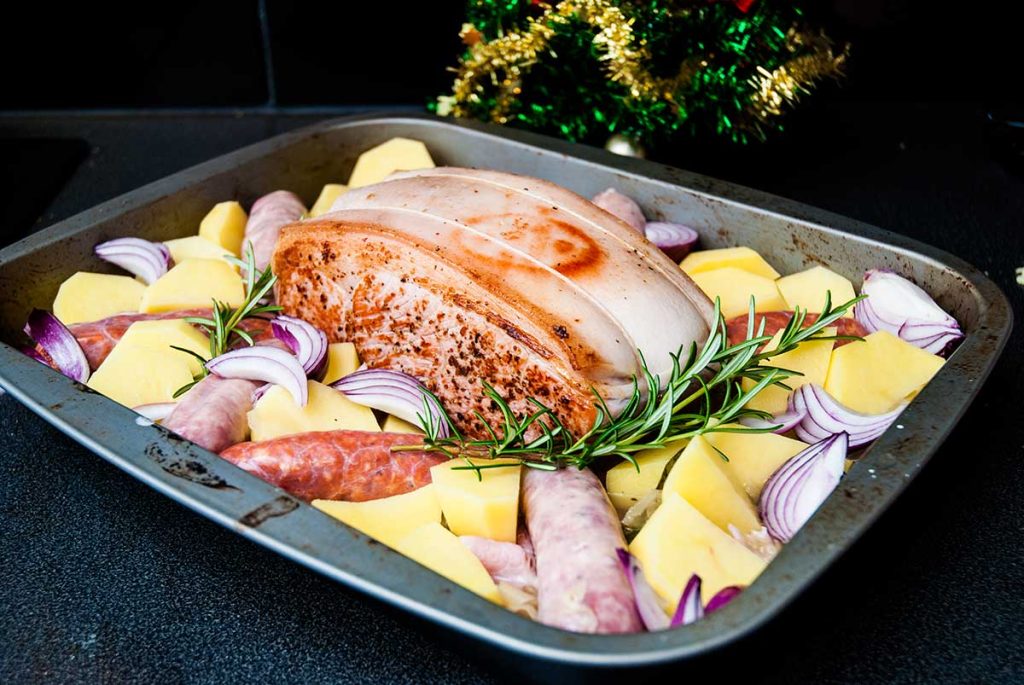
- In a large roasting pan, spread a layer of the sautéed sauerkraut.
- Cut the potatoes into wedges or small chunks, if using baby potatoes leave them whole or cut in half, depending on your preference. If using carrots, slice them half lengthwise or cut into small chunks. Place all the potatoes and carrots in a large bowl, drizzle with oil, and season with salt, black pepper, and sweet paprika. Mix everything to combine.
- Next, position the seared pork in the centre of the roasting pan and scatter the seasoned potatoes and carrots around it. Pierce through the sausages once with a knife, then arrange them on top or between the vegetables. This will allow the sausages to release their juices, which will infuse the potatoes and sauerkraut with flavour.
- Add the apple slices and rosemary sprigs, then pour over the white wine.
Variations: Here are some examples of how versatile this dish can be! Whether you choose different cuts of pork, and various types of sausages, or add carrots, parsnips, or bacon, you can customise it to suit your taste and what you have on hand.
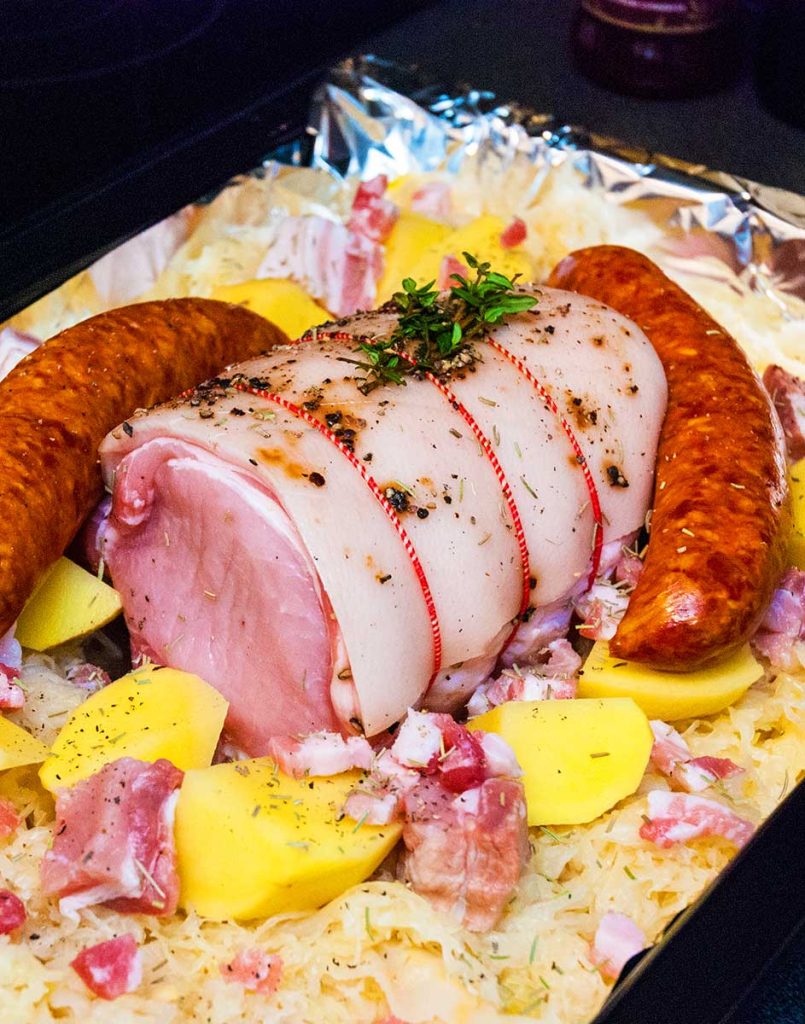
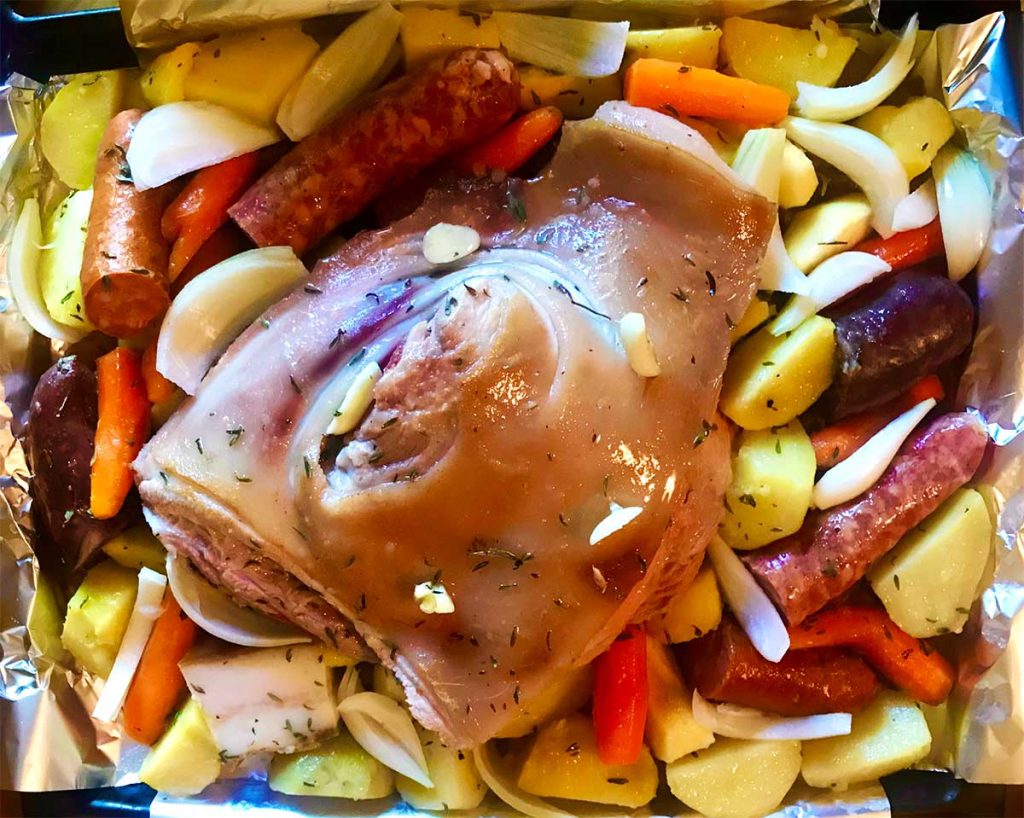
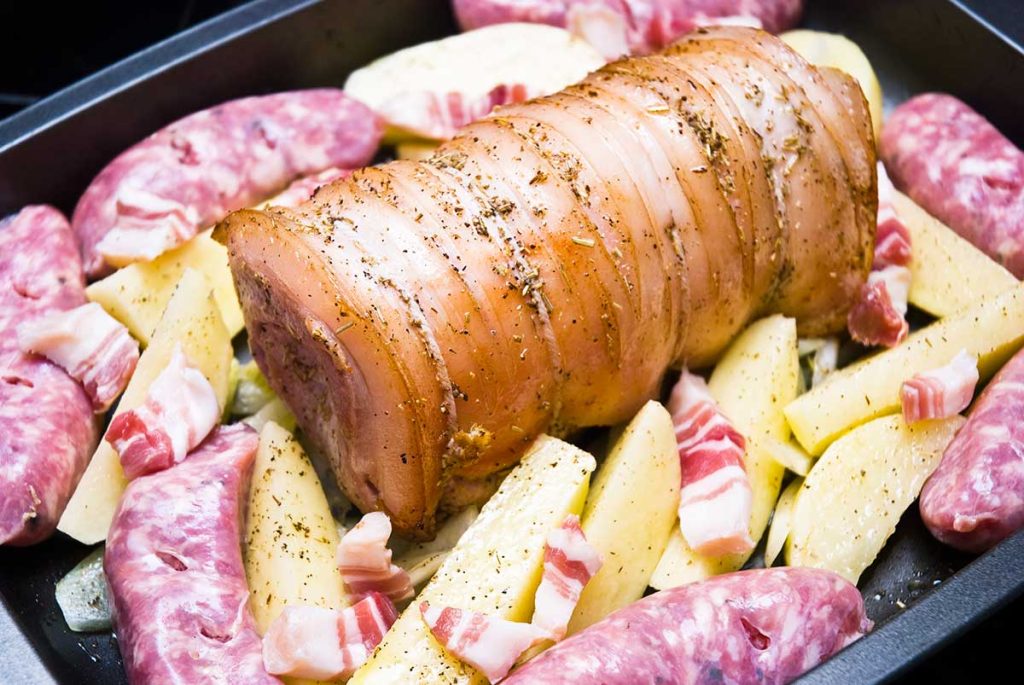
- Cover with foil, leave a few openings for steam to escape. Roast at 200 C for about 1.5 hours. During the last 30 minutes, remove the foil and return the dish to the oven to allow everything to crisp up nicely!
- Once done, remove from the oven, cover with foil again, and let it rest for about 20 minutes before serving.
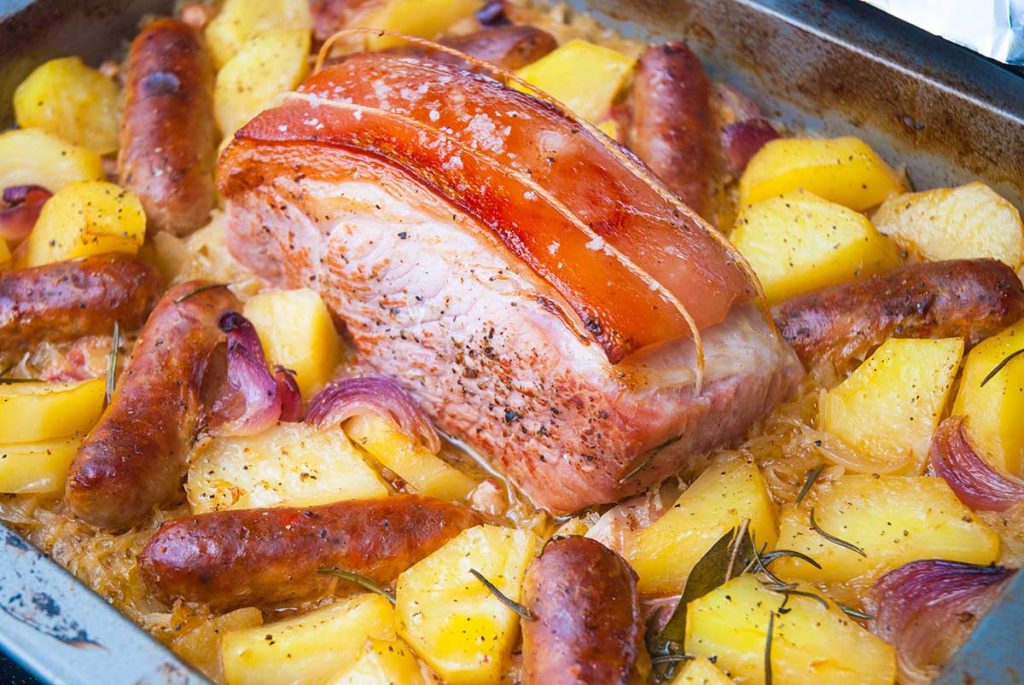
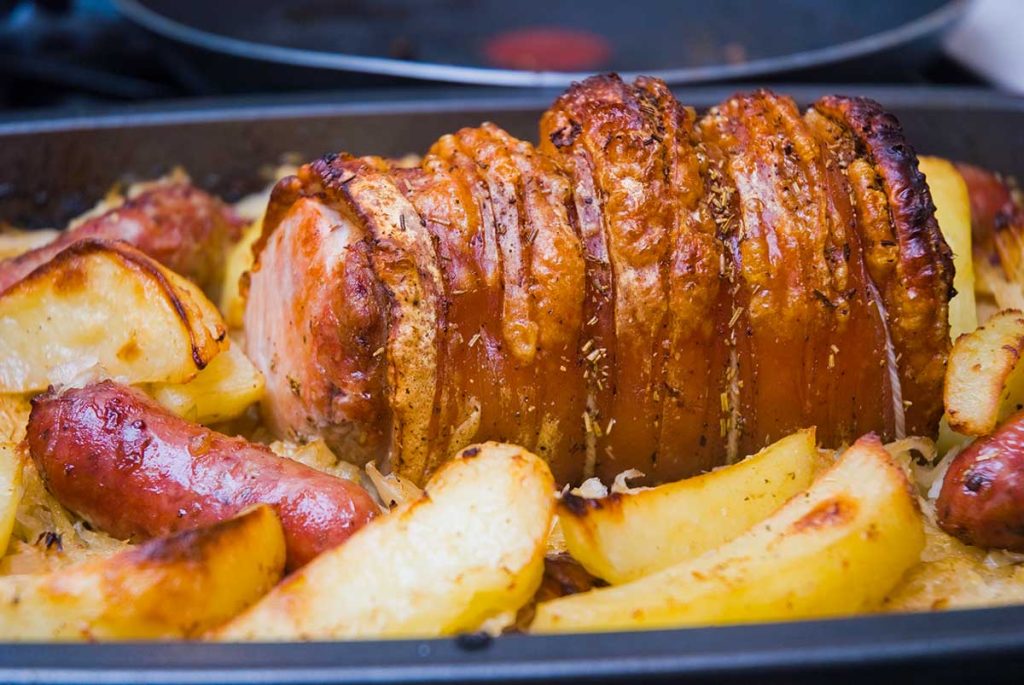
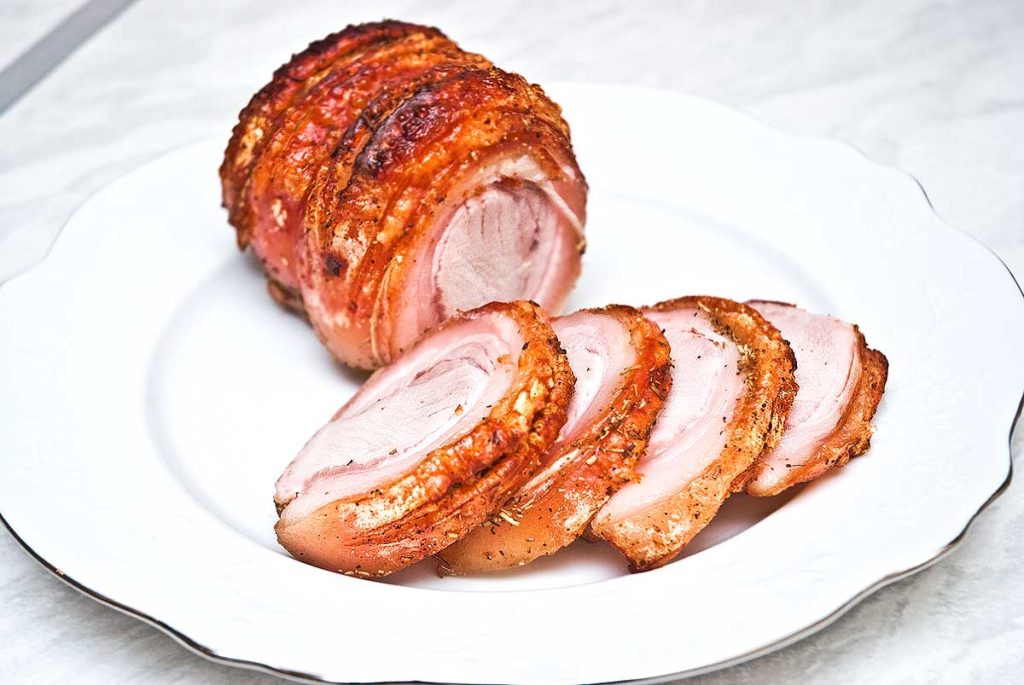
Serving
Slice the pork to your desired thickness, whether thin or thick, and serve alongside the roasted vegetables, sausages, and sauerkraut.
This dish can be served rustic-style, with everything piled onto a large platter for a casual, family-style meal. Alternatively, it can be presented more elegantly, with thinly sliced pork, neatly arranged sausages, and individually plated vegetables, making it suitable for formal occasions.
For extra flavour, serve it with apple sauce or mustard. Pickles or a fresh salad also make excellent sides to round out the meal.
Recipe card
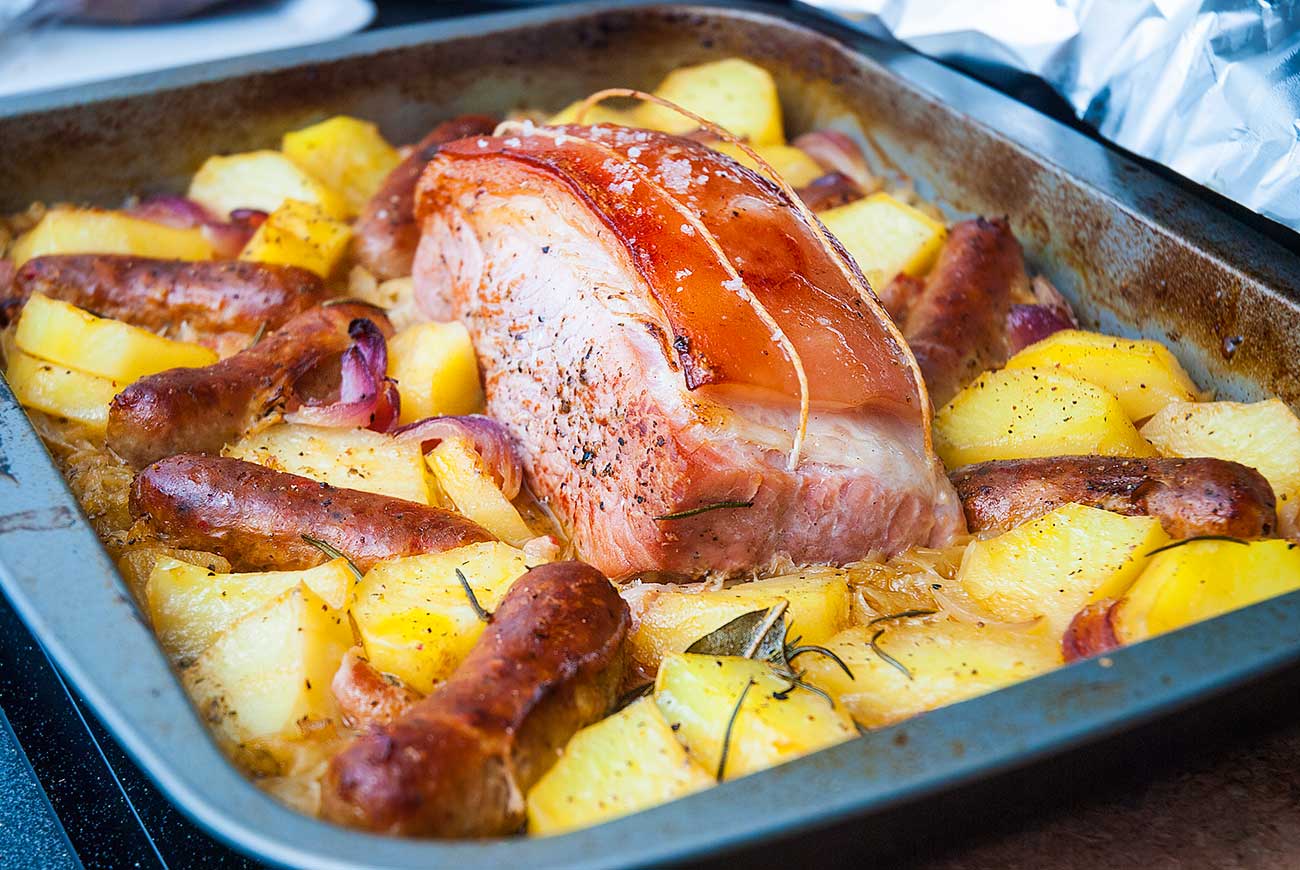
New Year’s Eve Festive Pork Roast with Sauerkraut and Potatoes
Ingredients
- 1 kg boneless pork leg joint
- sunflower oil - for searing the pork and for coating the vegetables
- 4 potatoes
- 4 – 6 sausages
- 1 red onion
- 1 yellow onion
- 4-5 cloves garlic - or as many as you like
- 1 apple
- 400 ml white wine - regular or sparkling
- a few rosemary sprigs
- 1-2 tsp sweet or smoked paprika - for potatoes
- salt, pepper - to taste
- 2 carrots - optional
FOR THE SAUERKRAUT
- 800 g sauerkraut
- ½ cup chopped bacon, pancetta cubes
- 1 apple
- 1 onion
- 2 garlic cloves
- 2-3 bay leaves
- 2 tsp marjoram
- 1/2 tsp caraway seed
- ½ tsp black pepper
Instructions
- Pork: Rub the pork with sweet paprika, salt and pepper, then sear it in a pan with a little oil until browned on all sides to lock in the juices.
- Sauerkraut: In a pan, sauté onions, apples, and bacon for 7 minutes until slightly crispy. Add chopped garlic and bay leaves, and fry for 1-2 minutes.
- Add the sauerkraut, season with pepper, caraway, and marjoram. Add 1 cup of water and simmer for 15 minutes.
- Assemble the dish: In a large roasting pan, layer the sautéed sauerkraut. Cut potatoes (leave baby potatoes whole or halve them), chop carrots ( if using), and place in a large bowl. Drizzle with oil, add salt, pepper, and paprika. Place the seared pork in the centre and scatter the vegetables and sausages around it. Pierce the sausages. Add apple slices and rosemary sprigs, then pour white wine all over the vegetables.
- Roast: Cover with foil (leaving a little room for steam) and roast at 200°C for 1.5 hours. Remove the foil in the last 20 minutes for crisping.
- Once done, let rest for 20 minutes before serving.
